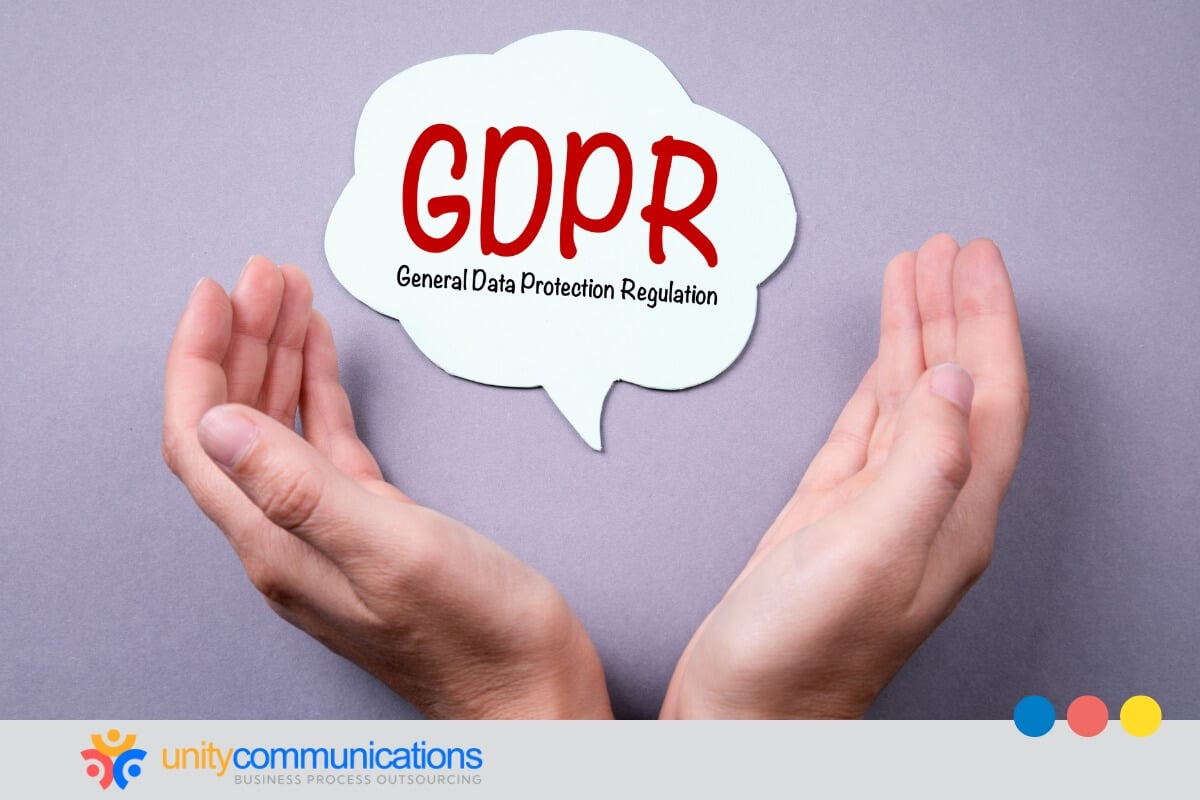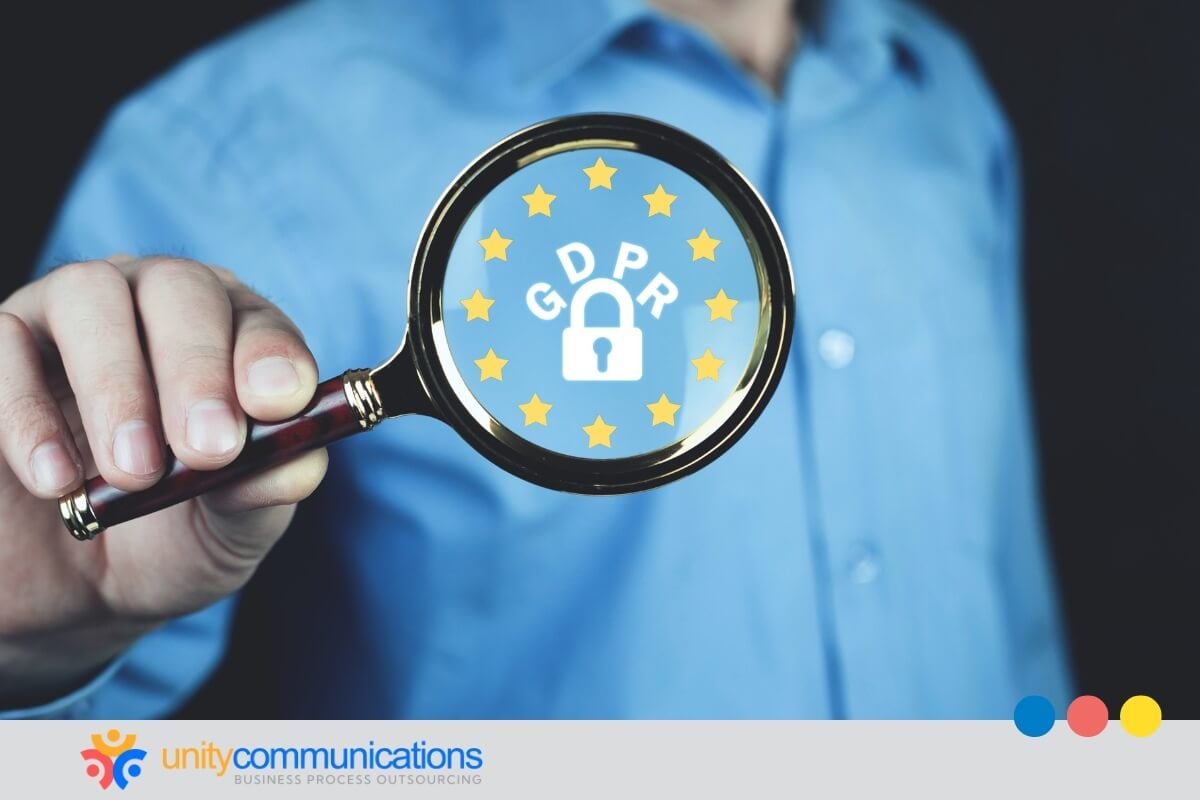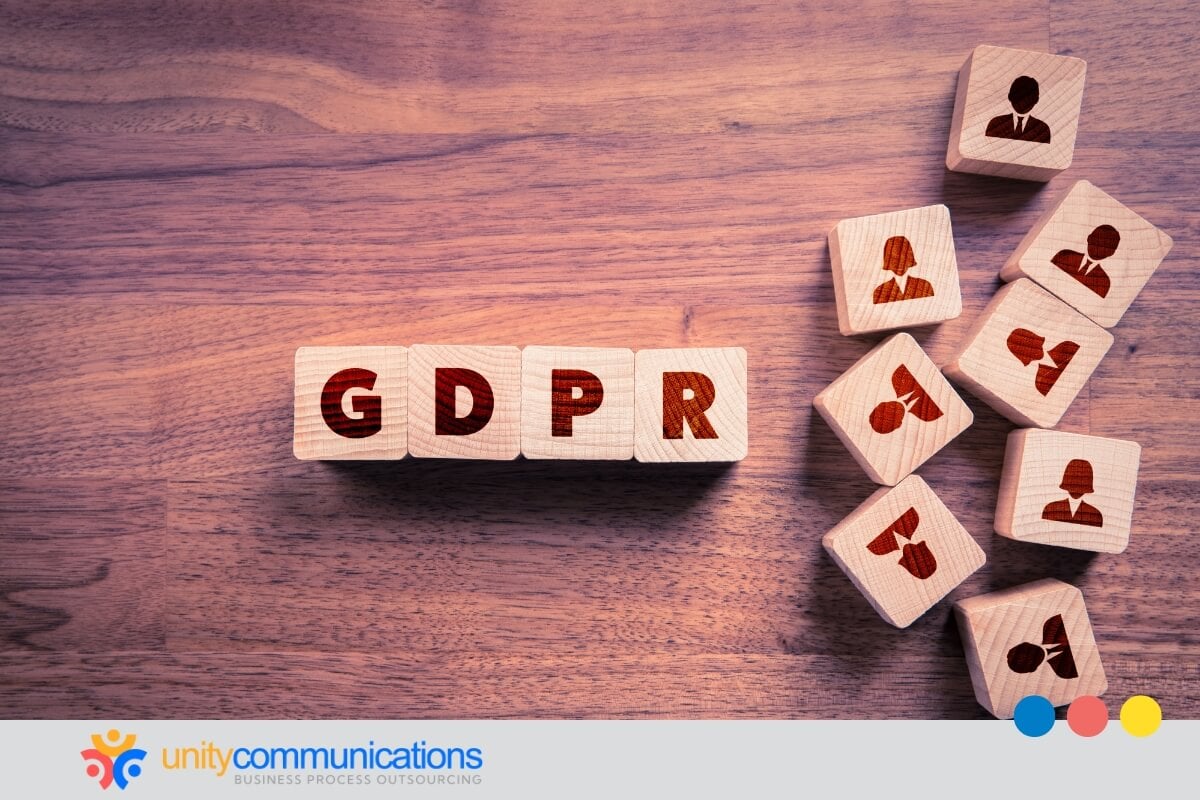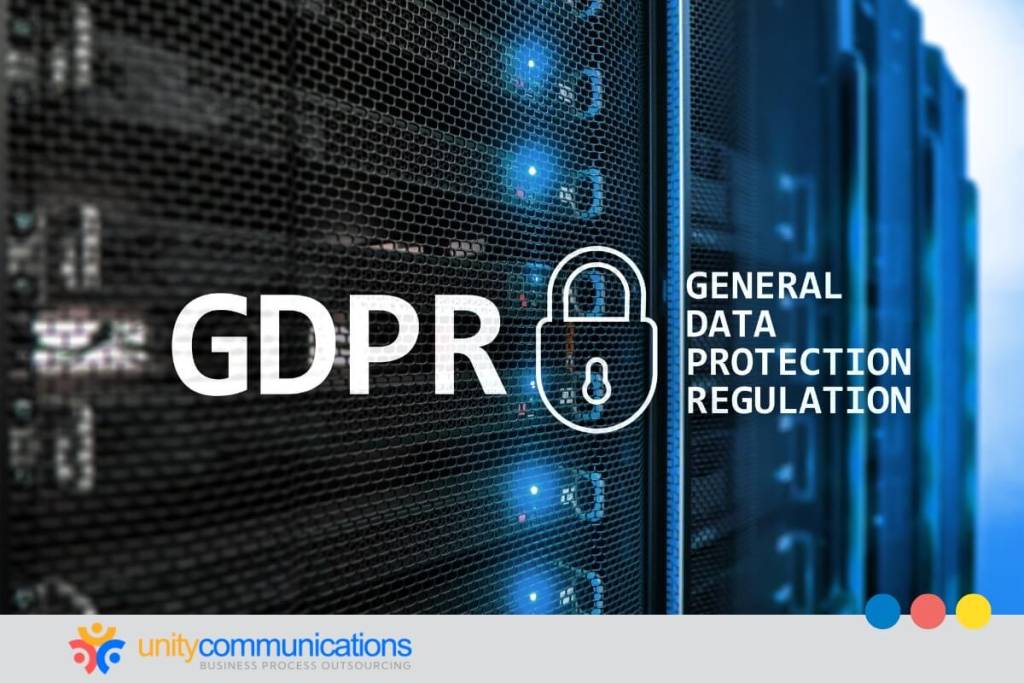IN THIS ARTICLE
Table of Contents
The implementation of the General Data Protection Regulation (GDPR) might have led to a shared sense of apprehension among administrative staff worldwide. European developments have far-reaching implications for businesses everywhere in our interconnected global landscape.
Compliance with the GDPR standards is beneficial even for business process outsourcing (BPO) companies and clients who do not handle data from European citizens. GDPR compliance fosters customer trust, and cultivating trust is consistently advantageous in call and contact centers.
This article discusses GDPR compliance in BPO and how service providers navigate the legislation’s complexities.
What Is GDPR?

The GDPR is European Union legislation that safeguards the personal data and privacy of EU citizens globally. It aims to streamline data flow among member states while bolstering EU citizens’ rights regarding how organizations handle their data.
The GDPR applies to any organization processing the personal data of EU citizens, regardless of their location within and outside the region. Any firm dealing with EU citizens’ data must comply with the GDPR rules.
Organizations fall under GDPR if they either have a presence in an EU member state or handle the data of EU citizens.
The GDPR safeguards various forms of data that can identify individuals, including:
- Traditional information such as names, addresses, dates of birth, and ID numbers
- Web-based data such as RFID tags, user locations, IP addresses, and cookies
- Racial and ethnic data
- Biometric data
- Health and genetic data
- Political opinions
The GDPR implementation also encompasses call recordings. In typical call center practices, agents must obtain explicit customer consent before the call begins. A generic statement (e.g., “This call may be recorded for training purposes”) is no longer sufficient.
Failing to comply with these regulations has significant financial consequences for companies and BPO call centers, underscoring the importance of comprehending GDPR rules when operating in Europe.
Noncompliant companies may initially receive a written warning. This is followed by routine data protection audits and fines of up to 4% of their annual global turnover or €20 million, whichever is higher. The severity of the violation determines the specific fine imposed.
The Importance of GDPR Compliance in BPO Contact Centers
So, what is a BPO call center, and why must it be GDPR-compliant? GDPR compliance in BPO call centers is crucial due to their frontline role in customer communications and extensive access to personal customer data. These factors present a heightened challenge in ensuring adherence to regulations.
Individuals have the right to access, modify, and erase their data. Under the GDPR, call centers and organizations are responsible for safeguarding personal data. They must restrict access to personal data, allowing only legitimate customers to access it.
Data protection should be integral to all outsourced business processes, products, and services. Employees must also be informed of their obligation to protect personal data. Here are the risk factors call centers must address to improve regulatory compliance:
- Amount of data. With their wealth of information, contact centers are targets for fraudsters who mine data and launch attacks across various channels. Vulnerabilities in interactive voice response (IVR) and knowledge-based authentication (KBAs) further expose data to potential breaches.
- Lack of security. Unprotected contact centers are attractive to fraudsters due to multiple vulnerabilities, necessitating a multilayered security approach. Cross-channel enablement allows for data mining that might lead to fraud at a later stage, complicating the identification of breach sources.
- Social engineering. Agents might be pressured to deliver top-notch customer experiences while lacking fraud identification training. Due to psychological manipulation, they may unintentionally facilitate fraud through their actions or disclosure of private information.
- Fraud technology. Readily available fraud technology, such as spoofing and voice distortion, enables fraudsters to impersonate legitimate callers. This creates openings for data breaches.
How GDPR Changes the Role of BPO in Data Management

The GDPR has instigated significant transformations in contact centers, resulting in collective fines exceeding €4 billion.
A common perspective is that GDPR can enhance the personalized use of data. Although companies can reach out to fewer individuals, those contacted should theoretically be more engaged. This is because they have actively consented to be contacted and likely have a legitimate interest.
This represents a positive development for companies that prioritize a customer-centric approach. Such practices contribute to heightened engagement and client conversions, fostering improved experiences and strengthening the customer-brand bond.
Here are other ways GDPR compliance affects data management in BPO:
- Create data protection awareness. GDPR applies universally within a company, necessitating widespread awareness. BPO firms and outsourcing clients should establish a dedicated team for GDPR implementation and consider appointing a data protection officer to oversee customer data collection, storage, and processing.
- Justify call recording. BPO firms and outsourcing clients must provide valid reasons for call recordings. Acceptable reasons include consent, contractual obligations, legal requirements, and participant, public, or legitimate interests. Call centers must obtain customer consent and clearly state the purpose of recording.
- Review data storage and accessibility. Contact centers must secure personally identifiable information (PII) according to the GDPR. Incorporate customer rights such as the right to be forgotten, data transfer, and access. Evaluate data storage practices and ensure accessibility while complying with the GDPR.
- Notify customers about data breaches. The GDPR mandates organizations to report data breaches to authorities and affected individuals within 72 hours. Implement tools and techniques for timely detection and reporting of data breaches in compliance with GDPR.
- Acknowledge customers’ power to delete. The GDPR empowers customers to request the deletion of their data from companies’ storage. To comply, organizations must conduct audits, maintain recording histories, and develop technical capabilities for future deletion upon customer request.
- Provide easy access to personal information. Under GDPR, customers can access their data in a structured digital format. Organizations should facilitate easy customer access to data, fostering trust and confidence. Providing flexibility for customers to manage and access their information aligns with GDPR guidelines.
Ways BPO Firms Ensure GDPR Compliance in Call Centers
Outsourced contact centers must be vigilant because GDPR broadly defines personal data as any information linked to an identified individual. This information encompasses data accessible by agents, including telephone numbers within customer relationship management (CRM) systems that identify callers.
Regardless of their location, outsourcing clients and BPO organizations processing the personal data of EU consumers are subject to GDPR.
Ensuring GDPR compliance in the BPO sector requires significant effort from call center leaders to avoid penalties and related issues. However, some strategies can facilitate this task:
- Conduct regular training sessions for agents.
- Focus on understanding and adhering to laws and regulations relevant to your industry.
- Establish a data retention policy specifically for audio recordings.
- Provide digitized scripts and workflows to ensure agents’ 100% adherence.
- Monitor agent areas to guarantee the security of customer information.
- Mandate the encryption of personal information.
- Store call recordings in an encrypted format.
- Implement login authentication to protect all stored audio recordings.
- Maintain a digital and auditable trail of interactions, documents, and e-signatures.
- Simplify the process of deleting customer records.
- Utilize technology that streamlines compliance for both customers and agents.
The Bottom Line

GDPR requires organizations to be transparent and prioritize customers above all else. This regulation is set to enact substantial changes in the business world, guaranteeing comprehensive data privacy for customers.
Call center operations must routinely assess processes for GDPR compliance and make adjustments as needed. A trustworthy BPO company will go the extra mile to safeguard data through appropriate technical and organizational measures.
Let’s connect to find ways to ensure GDPR compliance in your BPO operations.





